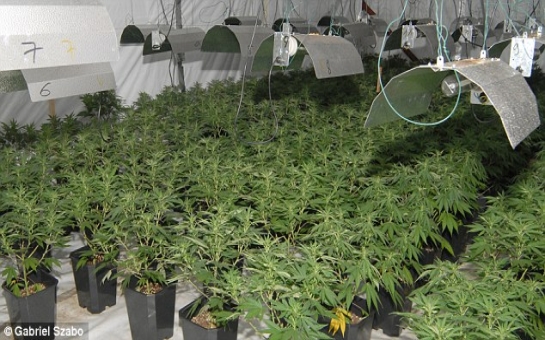Follow us !
How cannabis puts teenage brain at risk
Society
22:15 | 21.02.2014

How cannabis puts teenage brain at risk
Younger people, especially teenagers, have the greatest chance of developing addiction and psychosis from smoking cannabis than adults, scientists have revealed. A study shows that cannabis is particularly damaging to young people as their brains are still developing. Researchers from the University of Montreal and New York's Icahn School of Medicine at Mount Sinai reviewed more than 120 genetic studies that looked at cannabis and the adolescent brain, measuring the influence of genetics, environmental factors and previous studies to the idea of a 'gateway drug'.Professor Didier Jutras-Aswad, co author of the study said: 'Of the illicit drugs, cannabis is most used by teenagers since it is perceived by many to be of little harm. 'Most of the debates and ensuing policies regarding cannabis were done without consideration of its impact on one of the most vulnerable population, namely teens.'Data from epidemiological studies have repeatedly shown an association between cannabis use and subsequent addiction to heavy drugs and psychosis. 'Interestingly, the risk to develop such disorders after cannabis exposure is not the same for all individuals and is correlated with genetic factors, the intensity of cannabis use and the age at which it occurs. 'When the first exposure occurs in younger versus older adolescents, the impact of cannabis seems to be worse in regard to many outcomes such as mental health, education attainment, delinquency and ability to conform to adult role.'Cannabis effects our brain by interacting with it's chemical receptors, situated in the part of our brain that manages decision-making, learning and management, habit formation, management of rewards, motivation and motor function. Because the brain rapidly changes structure during adolescence, scientists believe usage of cannabis at this time greatly influences the way these parts of the user's personality develop.The scientists have developed this theory using adolescent rats, observing the differences in the chemical pathways of the brain that govern addiction and vulnerability.A quarter of teen users of cannabis will develop problems with abusive or dependent relationships with the drug, but there are suggestions that genetic and behavioral factors also have an effect. Prof Jutras-Aswad added: 'Individuals who will develop cannabis dependence generally report a temperament characterised by negative affect, aggressivity and impulsivity, from an early age. 'Some of these traits are often exacerbated with years of cannabis use, which suggests that users become trapped in a vicious cycle of self-medication, which in turn becomes a dependence.'While it is clear that more systematic scientific studies are needed to understand the long-term impact of adolescent cannabis exposure on brain and behaviour, the current evidence suggests that it has a far-reaching influence on adult addictive behaviours particularly for certain subsets of vulnerable individuals.'Writing in the journal Neuropharmacology, he concluded: 'It is now clear from the scientific data that cannabis is not harmless to the adolescent brain, specifically those who are most vulnerable from a genetic or psychological standpoint. 'Identifying these vulnerable adolescents may be critical for prevention and early intervention of addiction and psychiatric disorders related to cannabis use.'(dailymail.co.uk)ANN.Az










